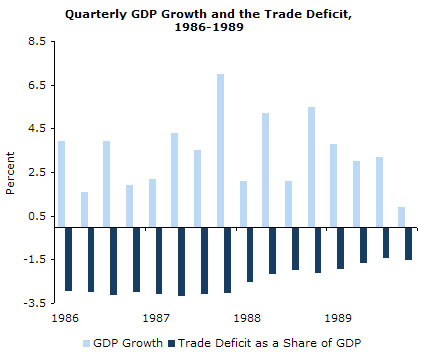October 05, 2010
What do conservatives have against reality? That is undoubtedly the question that readers of David Leonhardt’s Economix blogpost on the revaluation of China’s currency will be asking. Leonhardt turned the post over to Derek Scissors of the Heritage Foundation.
Mr. Scissors argues that the rise in the value of the Japanese yen in the 80s had little to do with the decline in the U.S. trade deficit with Japan. Scissors argued that the trade deficit just shifted to China. He claims that the main reason that the deficit fell in the 80s was the slowdown in growth and the onset of the recession.
There is a small problem with that argument. The trade deficit dropped while the economy was still growing rapidly. It fell from a peak of 3.1 percent of GDP in the 2nd quarter of 1987 to less than 2.0 percent of GDP in the 2nd quarter of 1988, as shown in the graph below. This quarter was sandwiched between two quarters of growth above 5.0 percent. The deficit declined further to less than 1.4 percent of GDP by the 3rd quarter of 1989, when the economy grew 3.2 percent.

In short, the recession cannot explain the decline in the size of the trade deficit because the deficit declined while the economy was still growing rapidly. The more obvious explanation is the decline in the value of the dollar that was negotiated at the Plaza Accords in 1986. This is yet another example of the facts being biased against conservatives.







Comments